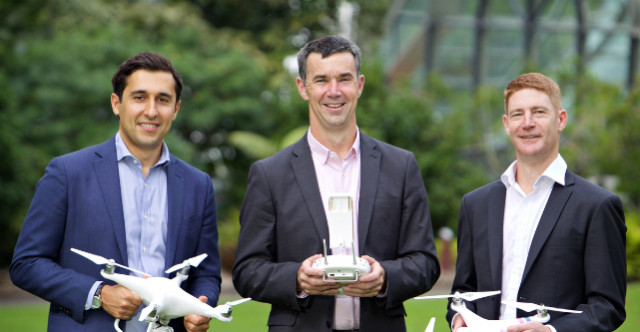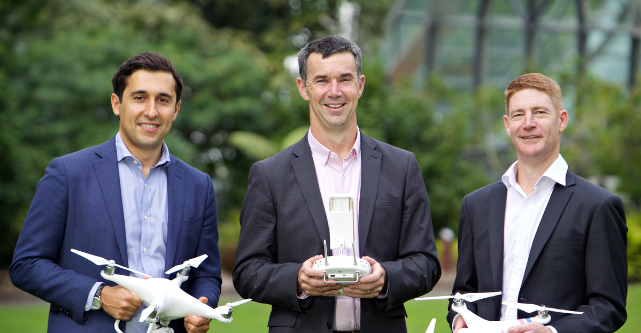DroneShield completes first successful tech IPO in Australia since Guvera’s failed listing – StartupSmart

A drone detection company has successfully completed the first tech IPO in Australia since Guvera’s highly controversial attempted listing was blocked by the ASX.
US-based DroneShield began trading on the ASX on Wednesday morning after raising $7 million through the IPO, giving it a market capitalisation of $27 million.
Last week Queensland-based streaming service Guvera, which had revenue of $1.2 million for the last year and a loss of more than $80 million, had its IPO blocked by the ASX, reigniting a debate about tech companies deciding to go public while still in a very early stage and without a fully developed business model.
According to its prospectus, DroneShield, which was founded in 2014, also had low revenue of $123,862 for the period ending September 30, 2015 and a statutory loss of $120,000.
A “comfortable” decision
But DroneShield CEO James Walker rejects any comparisons to Guvera, saying his startup’s IPO was oversubscribed and closed early and the public market was the only option for it.
“I feel very comfortable about the listing,” Walker tells StartupSmart.
“The alternative is VC money and that has some fairly big hurdles attached to it and it’s not a particularly deep pool in Australia. Listing was always the main game for us.
“We’ve done the work, we’ve raised the money we wanted to raise, we’re oversubscribed and we’ve had to significantly scale-back.
“It feels good – we’ve raised the money we need to grow the business.”
Walker says the public market is a legitimate funding route for early-stage tech companies and if everything is done properly, it should be up to the investors to avoid the companies that are too risky.
“There are people saying that only dud companies go on the ASX, but that’s not true at all,” he says.
“People will say that going to market, raising capital and listing with low revenue before you’re a sustainable business is not a slam dunk. But my comment to that is our prospectus was 131 pages and fairly detailed.
“Investors are smart people and if they can read the document they can make their own assessment on how risky the investment is. People can make their own call.”
Under new rules proposed by the ASX, DroneShield would have had to apply for special discretion as it would be unable to provide three full years of audited accounts.
Walker adds that the precautions put in place by the ASX have been effective, even in the case of Guvera.
“Everyone is talking about the other listing but the people that are reading the document are coming to the conclusion that they probably wouldn’t want to invest in it anyway,” he says.
“The rules are working.”
An emerging market
DroneShield, which is based in Virginia but will soon be establishing its headquarters in Australia, previously closed a $150,000 seed round along with a $950,000 convertible debt round.
Walker says the added transparency and compliance requirements of being a publicly listed company will be positive for the young startup.
“We’ve had good corporate governance from day one,” he says.
“When you’re growing globally you have to put in the right corporate structures from day one. We’re very comfortable about listing the company at this stage.”
Through the IPO, DroneShield issued 35 million shares at an issue price of 20 cents per share, up from the original issue of 25 million shares.
The CEO says interest in the listing was overwhelming, with investors identifying a quickly emerging and potentially lucrative market in drone security.
“It’s an interesting market and it’s only really starting to be created as we speak,” Walker says.
“We didn’t have one bad meeting. Everyone gets that there are millions of drones being created and that this also creates threats – there’s a story on this in the papers nearly every day.”
DroneShield offers proprietary hardware and software that can be installed in locations such as airports, prisons or major sporting events to detect drones from up to 1km away. The company currently has 42 distribution agreements in 28 countries.
The funding raised through the public offering will be used primarily for sales and marketing and further research and development, which will be run out of Australia.
“We’re a drone detection company today but the best solution is one that combines other technologies and comes up with a complete solution,” Walker says.
“We want to be a drone security solution not just a drone detection solution.”
This process will involve DroneShield licencing or acquiring other detection and counter-measure technologies.
Australia leading the way
Walker says Australia’s R&D tax incentive played a big part in luring the tech company to set up shop in the country.
“Australia is a great place – the skills here are just as good as in the US and there is a wonderful R&D tax scheme that is world-leading,” he says.
With drone security is set to become a burgeoning market, he says Australia currently boasts the best opportunities to break into it.
“The only place where investors can take a position in a listed entity that is focused on it is in Australia – there’s another listed company doing R&D on it,” Walker says.
“That’s good confirmation that the ASX is the right place for technology companies to come and build a market.”
Follow StartupSmart on Facebook, Twitter and LinkedIn.

